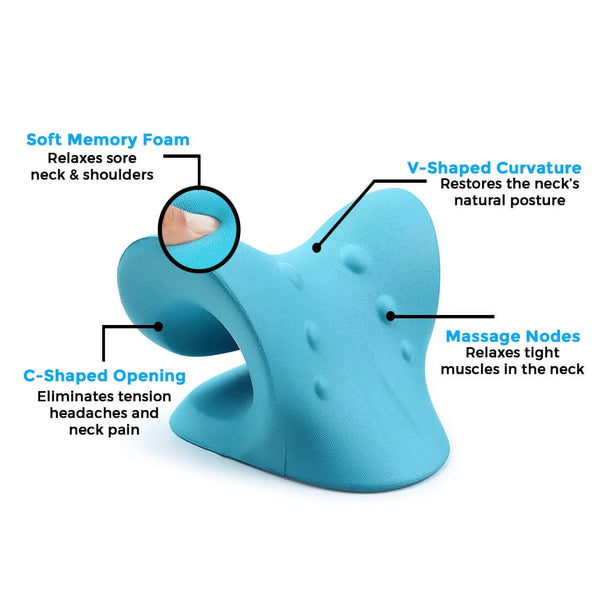Neck Cloud Evaluation: A Revolutionary Tool for Neck and Spine Health
Neck Cloud Evaluation: A Revolutionary Tool for Neck and Spine Health
Blog Article
The Effect of Stress And Anxiety on Neck Pain: Approaches for Decreasing Stress and Discomfort
In today's busy globe, it's no secret that stress has actually become a prevalent aspect in the beginning and worsening of neck discomfort. Join us on a trip to unwind the effect of stress and anxiety on neck pain and discover effective ways to reduce discomfort and enhance overall quality of life.
Understanding Stress-Related Neck Discomfort
Stress-related neck pain can show up as stress, tightness, or discomfort in the neck and shoulder location. The connection between tension and neck pain exists in the body's physiological reaction to tension, which can result in muscular tissue stress and rigidity in the neck muscles.

Identifying Common Stress Areas
Regularly experienced by individuals under stress and anxiety, tension locations in the body can offer beneficial insights into the physical indications of psychological stress. One usual tension area is the neck, where stress and anxiety commonly manifests literally. Stress headaches, rigid neck muscular tissues, and limited range of movement are usual symptoms of stress-related neck tension. The shoulders are an additional common area where tension gathers. Stress can cause the muscle mass in the shoulders to tighten up, bring about discomfort and pain. Additionally, the upper back is vulnerable to tension build-up, particularly in individuals that experience persistent stress and anxiety. Poor posture and prolonged sitting can intensify stress around. The jaw is also a typical place for stress-related stress, as many individuals squeeze their jaw or grind their teeth when emphasized. Recognizing these usual tension areas can help individuals acknowledge the physical indications of tension and take steps to address them before they escalate into chronic pain or discomfort.
Implementing Leisure Methods
To successfully handle stress-related tension in the body, implementing leisure methods is vital. Relaxation techniques are beneficial devices for minimizing neck pain triggered by anxiety. Deep breathing exercises can help relax the mind and kick back tense muscular tissues in the neck and shoulders (neck cloud). Exercising mindfulness meditation can additionally be valuable in easing tension and advertising relaxation. Progressive muscle mass relaxation, where you methodically strained and after that loosen up different muscle mass groups, can launch built-up tension in the neck location. In addition, activities like yoga and tai chi incorporate both physical activity and relaxation, making them efficient practices for minimizing stress and neck discomfort. Taking regular breaks throughout the day to stretch and loosen up can prevent muscle mass stiffness and tension from gathering. By integrating these leisure techniques into your day-to-day routine, you can assist take care of anxiety levels, reduce stress in the neck, and reduce pain associated with stress-induced neck pain.
Integrating Self-Care Practices
Integrating self-care practices is important for preserving general health and handling stress-related neck discomfort effectively. Involving in routine exercise, such as mild extending exercises or yoga exercise, can help alleviate tension in the neck and shoulders. Practicing great pose throughout the day and taking regular breaks from long term resting or display time can likewise stop stress on the neck muscle mass.
Moreover, prioritizing sufficient sleep and establishing a consistent rest regimen can add dramatically to lowering anxiety degrees and promoting relaxation. Developing a relaxing going to bed regimen, such as checking out a book or taking a warm bathroom, can assist prepare the body and mind for restful rest. In addition, keeping a balanced diet abundant in nutrients and staying moistened can sustain general health and lower swelling that may worsen neck pain.
Incorporating mindfulness techniques, such as deep breathing exercises or reflection, can help take care of stress and anxiety and advertise relaxation. Taking time for oneself, participating in pastimes, and setting borders to safeguard individual time are likewise important facets of self-care that can add to reducing stress and anxiety and relieving neck pain.
Looking For Expert Aid
How can individuals successfully resolve persistent neck pain that is impacting their everyday life and check my blog health? Looking for professional help can be a vital action in handling and alleviating neck pain.
Chiropractic specialists concentrate on back adjustment techniques to improve alignment and decrease tension in the neck area. Physical therapists best site use targeted stretches and exercises to enhance muscle mass, enhance versatility, and improve general neck function. Orthopedic professionals can provide advanced medical interventions such as shots or medical choices for serious situations of neck pain.
Conclusion

Stress-related neck pain can show up as tension, stiffness, or pain in the neck and shoulder location. The link in between stress and anxiety and neck discomfort exists in the body's physical feedback to stress and anxiety, which can result in muscular tissue stress and rigidity in the neck muscle mass. Stress frustrations, tight neck muscular tissues, and limited array of movement are usual signs and symptoms of stress-related neck stress. By including next page these relaxation strategies into your everyday routine, you can assist manage stress levels, lower stress in the neck, and ease discomfort associated with stress-induced neck pain.

Report this page